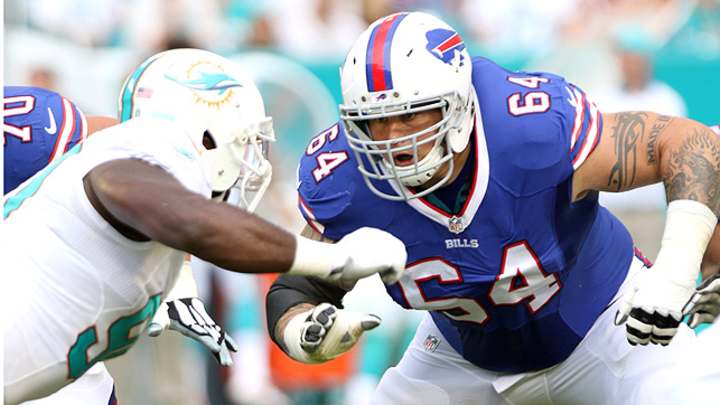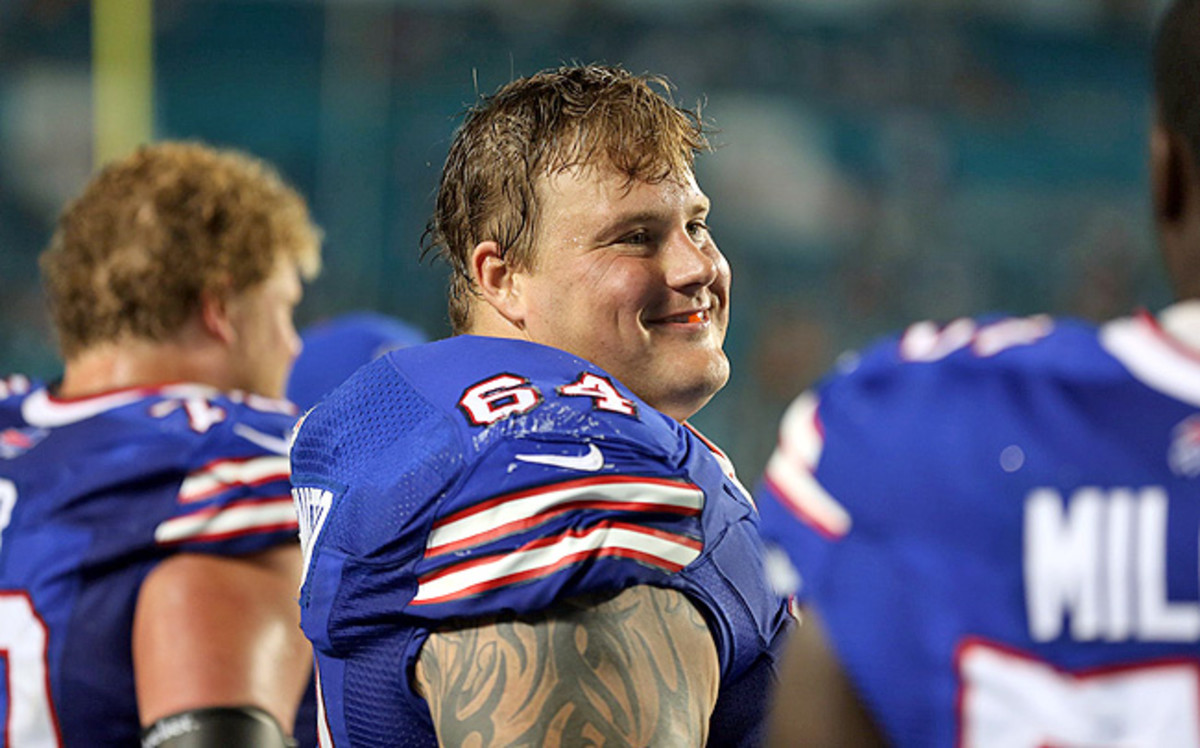Richie Incognito Is Back, and He’s Among the NFL’s Best

Editor’s note: Each week throughout the 2015 NFL season, The MMQB will publish an advanced analytics story by Neil Hornsby, the president of football operations at Pro Football Focus.
By Neil Hornsby
This is an article about guards. But it’s also about why bad players sometimes take the field while other, far better players, like Richie Incognito, sit at home.
If you’ll indulge me for a moment, I’ll digress slightly before circling back to pure football.
The NFL really isn’t like a lot of businesses you come across. It’s a strange mix of limited human resources with enormous external visibility. Just to be clear, when I say “human resources” I’m not just talking about a lack of quality guards, I’m also referring to general managers and other roles of that ilk. While the reason (and indeed the fact of) offensive linemen generally struggling when entering the NFL is a topic for another day, let’s consider GMs for a moment.
In most industries there isn’t usually a requirement for management level employees to have an intimate knowledge of the business when they first arrive. They bring other skills; process management, IT, recruitment, negotiation, management, etc. A tool set, if you will, that they then utilize in their new role as they get to grips with say, running a telco instead of manufacturing light bulbs. And all this happens outside the media spotlight. As a company CTO, I don’t go home listening to pundits on talk radio telling me the infrastructure manager I just hired is a bum, or spend my breakfast reading as Peter King illustrates how I’d botched my budget strategy.
My point is: There’s a limited number of these GM jobs, most of the employers insist it requires an in-depth knowledge of football, and a gazillion people all think they can do it better than the incumbent. Add to that the fact that, unlike coaches, there has been little desire for retreads among players. You lose a job, good luck finding someone to give you a mulligan.
There’s more. As Michael Lewis so eloquently described baseball in Moneyball as a social club, so is, to some degree, football. Many writers and commentators have been around it as long as the coaches, and if you challenge conventional wisdom, don’t always expect a logical debate. (For instance, there are those who believe sack stats are still the be-all end-all of pass rusher performance, and with others you might as well tell them the earth revolves around the sun as argue production trumps measurables.)

A natural human instinct to maximize tenure is camouflage; blend in with the rest of the heard and keep your head down. Even if you are convinced Tim Tebow is a far better option at back-up quarterback than Ryan Lindley Tebow is still the football equivalent of a zebra painting itself yellow. Last offseason, signing Richie Incognito came with a similar set of issues.
When player personnel guys asked me who the better free agent guards available were, I eventually gave up mentioning Incognito’s name. There are only so many raised eyebrows and furrowed brows you need to see to get the message.
The Bills finally broke from that conventional wisdom. Since his return, Incognito has played well. Through Week 3 he is PFF’s third-rated guard*, a smidgeon behind perennial Ravens All-Pro Marshal Yanda and Gabe Jackson, the Raiders’ budding star (you heard his name here first).
Incognito has given up a single QB disruption (a hit on Tyrod Taylor on which his signal-caller still got away a touchdown throw) and run-blocked impressively. Reach, double-team, second level, pull—I can give you positive examples of every type of block. In fact he has graded “above average” in every single facet of play in every game. Watching him, ironically, the word that comes to mind is “disciplined”. No penalties, no chat (well not that I saw), no issues; simply put, he looks like someone (to paraphrase Bill Belichick) just doing his job.
While the absolute level of his play and personal restraint may be a surprise, the fact he’s a good player shouldn’t be. In 2013, before his suspension, he was our 14th overall ranked guard and eighth-rated left guard. But when his suspension lifted in February 2014 he was hardly deluged with offers.
It’s possible his age (32) was a contributory factor. Another red flag for GMs is signing aging veterans just before their performance wanes—the NFL equivalent of being left holding the bag. For instance, despite being one of the three best guards in football in each of the last four years (Yanda and Green Bay’s Josh Sitton being the others), Evan Mathis didn’t get signed until the end of August. And even then he signed as only the 12th-highest paid left guard in football, according to overthecap.com.
However, Incognito’s salary cap number is not one third that of Mathis. And what has happened in Miami since the Dolphins dumped Incognito like the proverbial hot potato? Varying combinations of Nate Garner, Shelly Smith and Dallas Thomas all played left guard and struggled badly, culminating with Miami as our lowest rated OL in 2014.
This year the situation has, if anything, got worse. The 28 QB disruptions given up by the Miami guard pairing is worst in the NFL by some margin, and certainly a contributory factor to quarterback Ryan Tannehill’s poor play.
While we will need to see this through to the end of the season, for the moment Doug Whaley deserves praise for sticking his head over the NFL parapet. And if Incognito keeps playing like this, maybe he’ll win the league’s Comeback Player of the Year award.
No? You’re right. That’s probably a step too far for club members.
Neil Hornsby is the president of football operations at profootballfocus.com.

